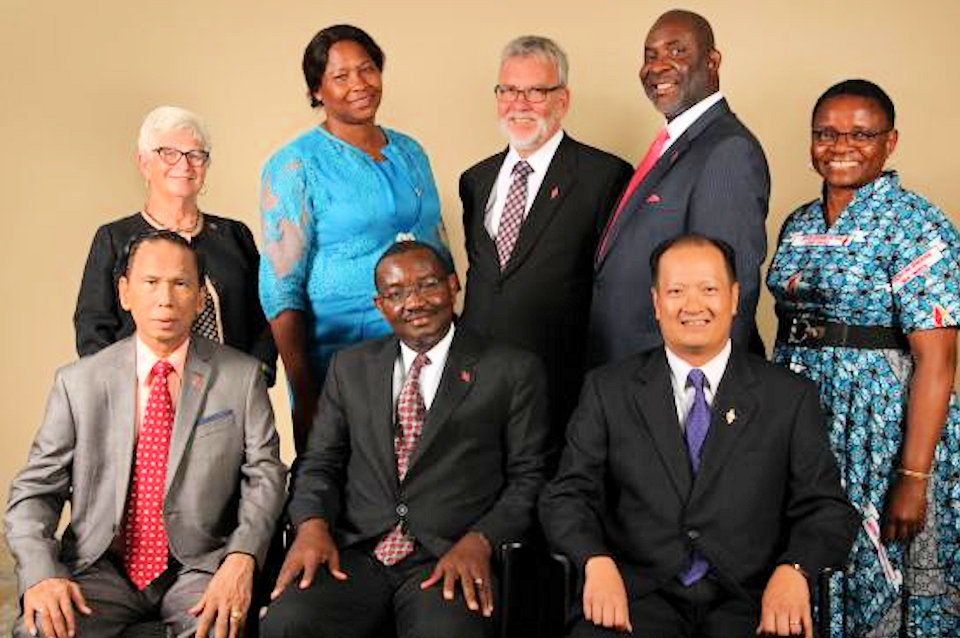The fall meeting of the Judicial Council will open with oral hearings on a requested “declaratory decision” on three plans created by the special commission.
LINDA BLOOM
United Methodist News Service
The United Methodist Church’s top court is continuing to play a key role as the denomination prepares for the legislative meeting that will help decide its future.
When the United Methodist Judicial Council convenes Oct. 23-26 in Zurich, its fall session will open with a three-part oral hearing related to a request for a “declaratory decision” on the three plans created by a special task force, the Commission on a Way Forward.
The request by the Council of Bishops asks whether the proposed legislation for the One Church, Connectional Conference and Traditional plans for the 2019 Special General Conference is constitutional.
The Council of Bishops, General Conference and Judicial Council are the constitutional bodies of the church, representing its executive, legislative and judicial powers.
As its website points out, the Judicial Council “determines the constitutionality of acts or proposed acts of the General, Jurisdictional, Central, and Annual Conferences” and “rules on whether acts of other official bodies of the denomination conform to The Book of Discipline.”
General Conference elects nine members, as well as alternates, to eight-year terms on the Judicial Council.
The Rev. Susan Henry-Crowe, currently the top executive of the United Methodist Board of Church and Society, served on the Judicial Council from 1992-2000 and 2004-2012 and was its president from 2008-2012.
Although the top court’s decisions can sometimes have political ramifications, she pointed out that “of all the jobs I’ve held in the church, the Judicial Council was actually the least political in the time in which I served.”
Henry-Crowe believes the expectation has grown that Judicial Council will resolve conflicts within the church, but that is not its function. The council’s job, she stressed, is to articulate the constitution and the law of the church.
“What is in the constitution is more binding,” Henry-Crowe said. “It’s the constitutional principles that hold us together.”
The Judicial Council hearings, Oct 23-26, will be livestreamed. For details of the docket and how to watch the proceedings, click here.
The Rev. Ted Walter of Columbia, South Carolina, who was a Judicial Council member from 1992-2000, believes it is important “for the average lay person in the local church” to understand how Judicial Council operates.
General Conference, the denomination’s top legislative body, is the only entity that has the authority to speak on behalf of The United Methodist Church. But any uncertainties raised about church law are referred to Judicial Council for review and a final decision.
“Once the Judicial Council deals with a matter, as far as the council is concerned that becomes the law of the church,” Walter said.
While the top court rules on the constitutionality and legality of any action taken by a body created or authorized by General Conference or a jurisdiction or central conference, it does not create laws or standards on its own.
As an example, Walter pointed to his experience on the council with annual conferences that tried to design a new plan of structure. “The council did not assume the responsibility, nor should it, to create a structure plan to send out to annual conferences to become their structure guide,” he explained.
Instead, the court would review the structure plans “and indicate where it was OK and not OK” in accordance with the Book of Discipline, he said.
Former Judicial Council member Sally AsKew of Greensboro, North Carolina, also stressed the court’s oversight role. “The Judicial Council can say whether something is constitutional or not, but it cannot write the legislation,” she said.
She did note that it is helpful when the council receives guidance from the petitioners about which parts of legislation may need to pass the constitutional test.
AsKew served from 1988-1996 and 1996-2004. She was the council’s vice president from 1992-1996 and secretary from 1996-2004. From 2008-2016, she was the council’s first clerk.
Given the limited time that Judicial Council has at its meeting in Zurich and the hundreds of pages of paperwork involved, she thinks it will be a challenge for the court to review all three proposals in the Way Forward report.
AsKew remembers how the Judicial Council struggled with a denominational restructuring plan called “Plan UMC” during the 2012 General Conference in Tampa, Florida, “because they weren’t given specific (constitutional) things in the plan to discuss.”
Faced with a limited amount of time before the conclusion of the 2012 General Conference, she said, Judicial Council members cited the most obvious constitutional issues hindering the plan and pointed out that it was not an exhaustive list.
In its 2012 ruling, the court unanimously declared Plan UMC “unconstitutional,” noting that legislative functions related to the creation and establishment of general church boards and agencies reserved to the General Conference “may not be delegated.” The court also said the establishment of a “General Council for Strategy and Oversight” under the plan intruded into the constitutional authority of the Council of Bishops.
Whatever the ruling — or even a decision not to rule — made by this Judicial Council at the conclusion of its Zurich meeting, the court’s role will not be finished.
When the special General Conference meets Feb. 23-26 in St. Louis, the Judicial Council’s continuing job will be “to answer questions of constitutionality that are posed by that body itself,” AsKew said.
Last Updated on November 1, 2023

